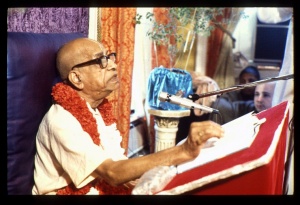SB 10.33.10

A.C. Bhaktivedanta Swami Prabhupada
Please note: The synonyms, translation and purport of this verse were composed by disciples of Śrīla Prabhupāda
TEXT 10
- kācid rāsa-pariśrāntā
- pārśva-sthasya gadā-bhṛtaḥ
- jagrāha bāhunā skandhaṁ
- ślathad-valaya-mallikā
SYNONYMS
kācit — a certain gopī; rāsa — by the rāsa dance; pariśrāntā — fatigued; pārśva — at Her side; sthasya — who was standing; gadā-bhṛtaḥ — of Lord Kṛṣṇa, holding a baton; jagrāha — took hold of; bāhunā — with Her arm; skandham — the shoulder; ślathat — loosening; valaya — Her bracelets; mallikā — and the flowers (in Her hair).
Translation and purport composed by disciples of Śrīla Prabhupāda
TRANSLATION
When one gopī grew tired from the rāsa dance, She turned to Kṛṣṇa, standing at Her side holding a baton, and grasped His shoulder with Her arm. The dancing had loosened Her bracelets and the flowers in Her hair.
PURPORT
The previous verse states that Śrī Kṛṣṇa honored the gopīs for their dancing and singing, and in this verse we see how the gopīs responded by dealing intimately and confidently with Him. Here a tired gopī held on to Kṛṣṇa's shoulder with her arm, resting against Him.
Śrīla Jīva Gosvāmī explains that the word gadā in this verse indicates a baton suitable for a dancing master. Lord Kṛṣṇa brought this item of paraphernalia to enhance His enjoyment of the rāsa dance. Śrīla Viśvanātha Cakravartī states that the gopī mentioned here is Śrīmatī Rādhārāṇī, whereas the two gopīs mentioned in the previous verse are, in order, Viśākhā and Lalitā.